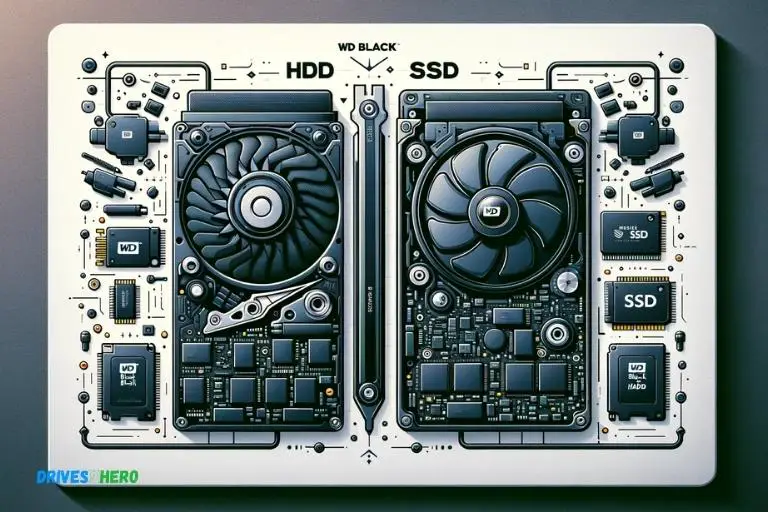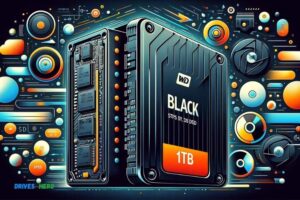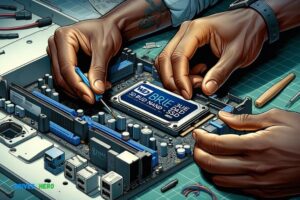Wd Black Hdd Vs Ssd: Which One Is More Preferable?
When comparing WD Black HDD to SSD (Solid State Drive), the primary distinction lies in their storage technology and performance.
The WD Black HDD, a traditional hard disk drive, offers expansive storage capacities at a more affordable price per gigabyte. However, it operates with moving mechanical parts, resulting in comparatively slower read and write speeds.
On the other hand, the WD SSD, specifically the WD Blue series, employs flash memory technology, eliminating mechanical components and significantly boosting data access speeds.
While the HDD remains a cost-effective solution for extensive data storage, the SSD’s superior performance makes it an ideal choice for users prioritizing speed and efficiency in their computing experience.

Key Takeaway
Assessing Speed And Response Times
Assess the speed and response times of WD Black HDD and SSD to determine their performance capabilities. Evaluate the differences in their processing speeds and overall efficiency.
Sequential Read And Write Speeds:
- WD Black HDD: With a WD Black HDD, you can expect decent sequential read and write speeds. It is designed to offer reliable and consistent performance for various tasks, including gaming, multimedia, and data-intensive applications.
- SSD: Unlike HDDs, SSDs excel in terms of sequential read and write speeds. They use flash memory technology to deliver significantly faster data transfer rates. When you have large files to transfer or need to access data quickly, an SSD is the way to go.
Random Read And Write Speeds:
- WD Black HDD: When it comes to random read and write speeds, HDDs are typically slower compared to SSDs. While WD Black HDDs are optimized for sequential tasks, they may not perform as well in scenarios requiring random data access.
- SSD: SSDs shine in terms of random read and write speeds. They excel at handling small file transfers, which is vital for tasks like booting up your operating system or launching applications swiftly.
While HDDs like the WD Black offer satisfactory sequential read and write speeds, SSDs outperform them significantly in both sequential and random operations. If you prioritize speed and prompt response times, an SSD is the better choice.
However, if you require ample storage on a budget and are willing to compromise on speed, the WD Black HDD can still serve you well.
Evaluating The Capacity-To-Cost Ratio
Evaluating the capacity-to-cost ratio of WD Black HDD versus SSD helps determine the optimal storage solution for your needs.
With a focus on maximizing storage capacity while considering affordability, this analysis helps make an informed choice between the two options.
Hdd Capacity And Pricing
HDDs are renowned for their high capacity offerings, making them a popular choice for users with extensive storage needs.
Some key points to consider include:
- Higher capacity options up to several terabytes (: Massive storage space for your data)
- Reasonably affordable prices compared to SSDs (: A cost-effective solution for larger storage requirements)
- Great option for users who prioritize storage capacity over speed (: Suitable for archiving and data backup purposes)
Ssd Capacity And Pricing
SSDs, on the other hand, are known for their blazing-fast speeds and improved reliability.
While their capacity offerings have traditionally been lower compared to HDDs, advancements in technology have led to increased capacities at more competitive prices.
Here are some noteworthy aspects to consider:
- Growing range of capacity options up to several terabytes (: Ample storage space for most users)
- Prices have become more accessible over time, but still generally higher than HDDs (: A reasonably priced option for those looking for a balance between capacity and performance)
- Faster read and write speeds, resulting in quicker data retrieval and application loading times (: Ideal for gamers, content creators, and users who require faster operations)
It’s important to note that the capacity-to-cost ratio should be evaluated based on your specific needs and budget. If you require vast storage space at an affordable price, HDDs are a compelling choice.
However, if speed and reliability are paramount, SSDs offer a superior experience despite potentially higher price tags.
Analyzing Longevity And Resistance To Damage
Comparing the longevity and damage resistance of WD Black HDD and SSD reveals intriguing insights.
While HDDs offer robust durability, SSDs deliver superior resistance to physical impact and wear, making them ideal for demanding tasks.
Hdd Lifespan And Susceptibility To Failure
Hard Disk Drives (HDDs) have been around for decades and continue to be a popular choice for storing large amounts of data. However, they do have some limitations when it comes to longevity and resistance to damage.
Here’s what you need to know:
- Mechanical Components: HDDs consist of spinning platters and a mechanical arm that reads and writes data. These moving parts can be prone to failure over time, leading to potential data loss.
- Limited Lifespan: The average lifespan of an HDD is around 3 to 5 years. After this period, the risk of failure increases significantly.
- Susceptible to Physical Damage: HDDs are sensitive to physical shocks and vibrations. Dropping an HDD or subjecting it to excessive force can cause irreversible damage, resulting in data loss.
Ssd Lifespan And Resistance To Physical Damage
Solid State Drives (SSDs) offer a more advanced storage solution that addresses some of the limitations of HDDs.
Let’s take a closer look at their lifespan and resistance to physical damage:
- No Moving Parts: Unlike HDDs, SSDs have no moving mechanical components. This makes them more resistant to wear and tear caused by constant usage.
- Extended Lifespan: SSDs generally have a longer lifespan compared to HDDs, with an average expectancy of 5 to 7 years. Some high-quality SSDs can even last up to 10 years or more.
- Resistant to Physical Damage: SSDs are built to withstand physical shocks and vibrations better than HDDs. This means they are less prone to damage from accidental drops or jolts.
While HDDs have been widely used in the past, SSDs surpass them in terms of longevity and resistance to physical damage.
With their longer lifespan and improved durability, SSDs have become the preferred choice for individuals and businesses seeking reliable and robust storage solutions.
Examining Efficiency And Silent Operation
Examining functionality and noise reduction, the WD Black HDD and SSD offer efficient performance and silent operation.
These storage options present a choice between high-capacity traditional hard drives and fast solid-state drives, catering to diverse user preferences and needs.
Let’s explore each aspect individually:
Hdd Power Draw And Energy Efficiency:
HDDs draw power each time they spin their platters, which requires energy. The power draw of HDDs can vary depending on the model and usage.
Here are some key points to consider:
- HDDs consume more power during startup and spin-up as they require energy to get the platters spinning.
- Power consumption of HDDs primarily depends on their rotation speed, with higher RPM drives generally consuming more power.
- Seek operations and data transfers also contribute to power draw, although these operations consume comparatively fewer resources than the initial startup.
Ssd Power Draw And Silent Performance:
SSDs, on the other hand, have a different approach to power draw and silent operation.
Here are some points to consider:
- SSDs do not have moving parts like HDDs, resulting in lower power consumption. The absence of spinning platters eliminates the need for excess energy during startup and overall operation.
- SSDs primarily draw power during read and write operations, as well as during idle states. However, their power consumption is significantly lower than HDDs.
- Due to the absence of moving parts, SSDs operate silently, providing a noise-free experience compared to the mechanical sound generated by HDDs.
HDDs consume more power and generate noise due to their mechanical operation, while SSDs offer efficient power usage and a silent performance.
Understanding these differences can help users make an informed decision based on their specific needs and priorities.
Conclusion
The battle between WD Black HDD and SSD boils down to prioritizing speed or storage capacity. The WD Black HDD tends to offer larger storage options, making it ideal for those who require ample space for files, games, and multimedia.
On the other hand, SSDs provide lightning-fast speeds, which can significantly enhance overall system performance and loading times.
Whether you choose the WD Black HDD or SSD depends on your specific needs and priorities. If you are a content creator, gamer, or professional requiring vast storage options, the WD Black HDD might be the better choice for you.






